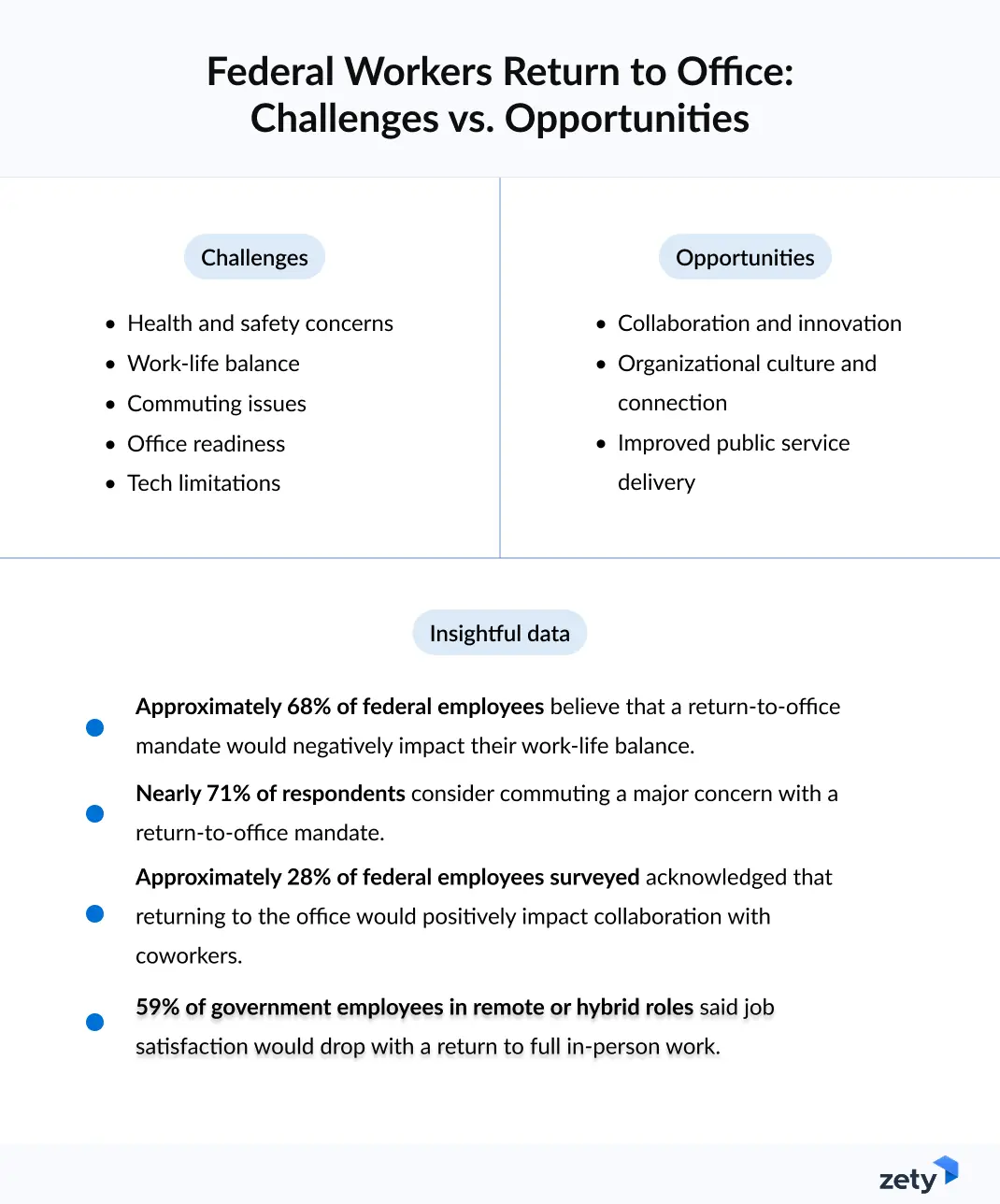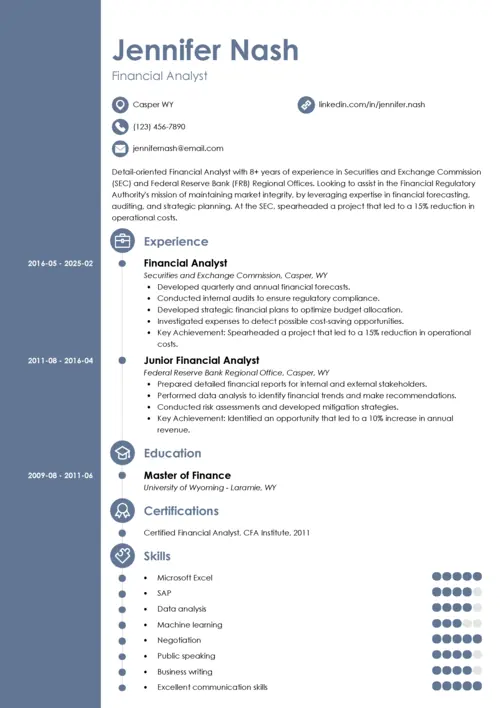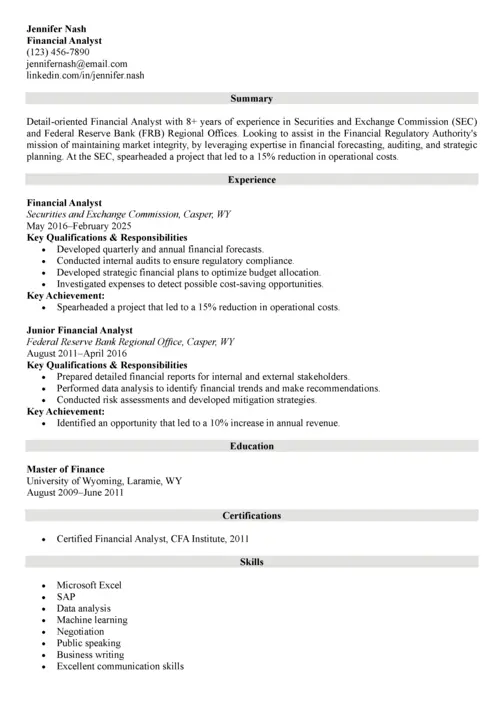As federal employees head back to the office, it’s a big change from the remote work routines they’ve got used to during the pandemic. While some see this return as an opportunity to reconnect with colleagues and restore office culture, others are grappling with the challenges of adjusting their work-life balance, managing commute times, and addressing lingering health concerns.
If you’re a federal employee facing this change, this article will help you make your return to in-person work a little easier.
Want to save time and have your resume ready in 5 minutes? Try our resume builder. It’s fast and easy to use. Plus, you’ll get ready-made content to add with one click. See 20+ resume templates and create your resume here.
Sample resume made with our builder—See more resume examples here.
One of our users, Brittanya, had this to say:
Zety really helped me create the best resume possible. It pointed out how things could be better on my existing resume and suggested many things to be re-worded or removed.
Why Employers Are Pushing for a Return to the Office
The pandemic forced federal agencies into a significant remote work experiment. Almost overnight, employees traded office desks for home setups—from spare rooms to kitchen tables—while keeping government operations running. It proved that federal work could happen remotely—and in many cases, just as efficiently, if not more so.
But as the pandemic faded, the federal government started pushing for a return to the office. The goal was to boost collaboration, improve service delivery, and rebuild agency culture in ways that remote work just can’t fully match. President Biden’s administration and the Office of Personnel Management (OPM) have set guidelines to help with the transition, aiming to balance in-person work with the flexibility employees have come to expect. However, the shift has come with its challenges. Former President Trump has said that if he’s re-elected, he’ll require all federal employees to return to the office—discarding hybrid work entirely. He argues that ending telework will bring back accountability and improve how agencies operate.
Is the RTO mandate a good reason to seek new opportunities? Learn here: Good Reasons for Leaving a Job
Federal Workers Return to Office: Challenges vs. Opportunities
For many federal employees, the return to the office brings a mix of emotions. While some are excited to renew face-to-face contact, others feel anxious or uncertain. Here are some of the most common queries:

Health and Safety Concerns
Even with better public health conditions post-COVID-19, some employees still worry about exposure to illnesses, particularly in crowded office environments. Keeping workplaces clean, well-ventilated, and safe is essential.
Work-Life Balance
Remote work has provided employees with greater flexibility to manage family commitments and personal well-being. A January 2025 survey by Federal News Network found that approximately 68% of federal employees believe that a return-to-office mandate would negatively impact their work-life balance.
Commuting Concerns
The thought of returning to daily commutes is overwhelming for many. After years of working remotely, the idea of spending time and energy on travel is a tough adjustment. The same survey found that nearly 71% of respondents consider commuting a major concern with a return-to-office mandate, highlighting the impact it would have on their spare time and overall work-life balance.
Office Readiness and Tech Limitations
Not every federal office is fully equipped for the hybrid models many agencies now favor. Outdated technology, inconsistent communication channels, and unclear policies can create friction during the transition.
Despite the challenges, returning to the office offers unique benefits that remote work couldn’t always provide:
Collaboration and Innovation
In-person interactions can cultivate deeper collaboration and spark innovation. Approximately 28% of federal employees surveyed acknowledged that returning to the office would positively impact collaboration with coworkers.
Organizational Culture and Connection
Being in the office can really help strengthen workplace culture and boost employee engagement. For a lot of people, face-to-face interactions make it easier to build connections with colleagues and create a more united work environment.
A recent survey found that around 17% of respondents believed that returning to in-person work would improve their workplace culture, showing just how important those in-person connections can be for fostering a positive and collaborative atmosphere.
Improved Public Service Delivery
In-person work is essential for certain roles, particularly in national security, public safety, and public service. Agencies like the FBI, DHS, and USPS rely on on-site staff to carry out mission-critical tasks. For example, FBI agents need to collaborate and access classified information, while USPS workers ensure timely mail delivery.
A study by Eagle Hill Consulting found that 59% of government employees in remote or hybrid roles said job satisfaction would drop with a return to full in-person work, but for roles requiring public interaction or security, being on-site remains very important.
Is a 40-hour week a thing of the past? Check here:The 40-Hour Work Week Needs to End
Key Tips for Federal Employees Returning to the Office
Transitioning back to the office doesn’t have to be a chore. Here are some best practices to help you adapt successfully if you’re a federal employee struggling with the mandatory change:
1. Prioritize Health and Well-being
Your health—both physical and mental—comes first. Stay informed about your agency’s safety protocols and take advantage of resources like Employee Assistance Programs (EAPs). Build time into your day for self-care, whether it’s a quick walk during lunch or a few moments of meditation.
2. Create a Work-Life Balance Strategy
Revisit your daily schedule to accommodate the commute and office hours. If your agency offers flexible scheduling, take advantage of it. Set boundaries around work and personal time to avoid burnout.
3. Rebuild Professional Connections
Make an effort to reconnect with colleagues. Schedule coffee catch-ups or informal meetings to rebuild relationships. Strong connections will help ease the transition and improve collaboration. A study by Gallup found that employees who have close friendships at work are more engaged and productive.
Additionally, a recent article from Time magazine discusses how work friendships can increase job satisfaction and productivity, but also acknowledges potential challenges such as role confusion and setting boundaries.
4. Optimize Your Workspace
A comfortable, organized workspace can boost productivity and reduce stress. Personalize your desk with items that make you feel at home—photos, plants, or even a favorite coffee mug. Taking time to create a space that suits your needs can improve focus and create a more inviting atmosphere, which ultimately leads to greater job satisfaction.
5. Adopt a Growth Mindset
View this transition as an opportunity for growth. Be open to learning new skills, adapting to changes, and contributing to discussions about improving your office environment. Embracing challenges with a positive attitude can help you build resilience and confidence as you adjust.
6. Leverage Hybrid Work Models (If Available)
If your agency offers a hybrid option, create a plan to make the most of both your in-office and remote workdays. Use office days for collaboration and remote days for deep-focus tasks. This balance can help you stay engaged with colleagues while also giving you uninterrupted time to work on projects that require more concentration.
Creating a resume with our builder is incredibly simple. Follow our step-by-step guide and use content from Certified Professional Resume Writers to have a resume ready in minutes.
When you’re done, Zety’s resume builder will score your resume and our resume checker will tell you exactly how to make it better.
Resources and Support for Federal Employees
As a federal employee, you have access to numerous resources created to make your return to the office as smooth and supportive as possible. These resources focus on mental health, work flexibility, skill-building, and technology, all of which can ease the transition and improve overall well-being.
- Employee Assistance Programs (EAPs): These confidential services offer counseling and mental health support for employees facing stress, anxiety, or other personal challenges. Many agencies also provide specialized resources through EAPs to help employees manage work-life balance and workplace conflicts.
- Expanded mental health and wellness initiatives: In addition to EAPs, many agencies offer on-site or virtual wellness programs, including mindfulness sessions, fitness classes, and stress management workshops. Prioritizing holistic well-being can significantly help employees overcome the emotional challenges of returning to the office.
- Flexible work arrangements: Many federal agencies have adopted telework and flexible hours, allowing employees to continue working remotely or adjust their schedules to better fit personal needs. Be sure to review your agency’s policies to understand your options for hybrid work, compressed workweeks, or flexible start and end times.
- Training and professional development: Agencies often offer programs and workshops to help employees build new skills, particularly for operating in hybrid or remote work environments. These might include training on collaboration tools, time management, communication skills, or adapting to new technology. Taking advantage of these opportunities can help you feel more confident and prepared for the transforming workplace.
- Technology support: For employees transitioning back to the office, ensuring access to the right tools and IT support is crucial. Whether it’s setting up ergonomic workstations, ensuring connectivity for hybrid meetings, or accessing software needed for productivity, federal employees can often rely on their agency’s IT department for assistance. Many agencies also provide training for using digital collaboration tools like Zoom, Microsoft Teams, or project management platforms.
Your productivity at work can be tracked in various ways. Learn more: Workplace Surveillance and Monitoring in 2025
Summary
Returning to the office is a significant change, but it also comes with a fresh opportunity to reimagine how federal work is done. By focusing on best practices, taking care of your well-being, and embracing a growth mindset, you can thrive in the transformed work environment, too.
Here’s a quick summary of what I’ve covered in the article:
- The shift from remote work to office work: The federal workforce adapted to remote work during the pandemic, proving its efficiency. Now, agencies are prioritizing in-person work to enhance collaboration, culture, and service delivery.
- Challenges and opportunities: While concerns like health risks, work-life balance, commuting, and technology gaps exist, in-office work fosters collaboration, strengthens culture, and improves public service.
- Best practices for a smooth transition: Federal workers coming back to the office should prioritize well-being, balance schedules, rebuild connections, and optimize workspaces. Stay flexible and consider hybrid models where possible.
- Available resources: Employee Assistance Programs, flexible work policies, professional development, and IT support can ease the transition. The return to office work is a chance to redefine your workplace, making it more flexible, connected, and effective for the future.
Plus, a great cover letter that matches your resume will give you an advantage over other candidates. You can write it in our cover letter builder here. Here's what it may look like:
See more cover letter templates and start writing.
Thank you for reading this article on the return-to-office transition for federal employees. If you're one of those affected, I hope this guide helps make the process smoother for you.
About Zety’s Editorial Process
This article has been reviewed by our editorial team to make sure it follows Zety's editorial guidelines. We’re committed to sharing our expertise and giving you trustworthy career advice tailored to your needs. High-quality content is what brings over 40 million readers to our site every year. But we don't stop there. Our team conducts original research to understand the job market better, and we pride ourselves on being quoted by top universities and prime media outlets from around the world.





